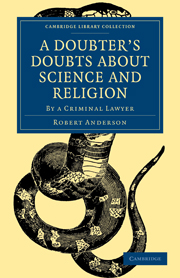Summary
“One of the first and noblest of human sciences”—such is the eulogy which Edmund Burke has pronounced upon the law. “It is,” he goes on to say, “a science which does more to quicken and invigorate the understanding than all other kinds of learning put together.” And if this estimate be just, it will probably be admitted that, for sharpening the intellect, the study and practice of the criminal law must bear the palm. But moral qualities are of greater worth than mere quick-wittedness, and no one who has much to do with criminals and crime can fail to suffer morally. We are told that the primitive attitude of the human mind is trust; distrust is the prevailing characteristic of any one who sees much of the shady side of human nature. He degenerates into a sort of high-class detective. By a perverted instinct he becomes systematically sceptical.
There are no sceptics in the old scholastic sense. The most ardent Pyrrhonist, if robbed of his purse, or struck over the head by a burglar, promptly forgets his theories, and gives proof of his belief in the certainty of objective knowledge. Philosophic scepticism, so called, is merely a conceit of sham philosophers; it never invades the sphere in which a man's interests require that he should believe and know. And, as Kant has aptly said, it is “not a permanent resting-place for human reason.” But scepticism is not necessarily Pyrrhonism.
- Type
- Chapter
- Information
- A Doubter's Doubts about Science and ReligionBy a Criminal Lawyer, pp. 1 - 5Publisher: Cambridge University PressPrint publication year: 2009First published in: 1889

